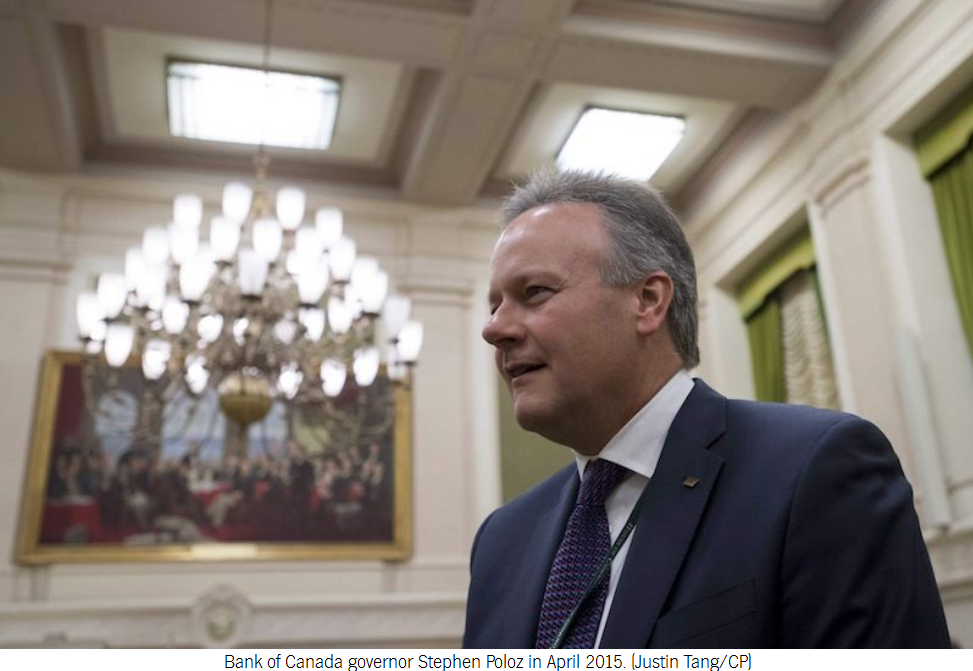
The Bank of Canada governor expressed confidence that regulatory changes were limiting home loans to those best able to finance them. It was the clearest statement yet that the central bank’s controversial decision to keep interest rates ultra-low won’t be altered over worries about a housing bubble or rising household debt levels.
Unlike their elected representatives in Ottawa—who continue to fetishize the economic virtue of balanced budgets—individual Canadians know what to do when presented with a once-in-a-lifetime opportunity to borrow money for virtually nothing.
Household debt as a percentage of disposable income was was 163.3% in the first quarter, Statistics Canada reported last week—only marginally lower than the record 163.9% ratio the agency calculated for the fourth quarter.
These figures are the source of considerable stress for some. Poloz doesn’t appear to be one of them. He isn’t dismissive of the risk; the central bank ranks “household imbalances” among the things that trouble it most. Poloz also has ordered extensive study of the situation. Not so long ago, the central bank even appeared poised to raise interest rates due to concerns over financial stability.
Those concerns have either faded, or, more likely, been usurped by bigger ones.
If debt is a problem, the easiest way to deflate it would be to raise interest rates. But for Poloz, that would be attacking a symptom of the post-crisis malaise, rather than the cause, which in his view is weak exports and business spending.
Last week, the Bank of Canada governor called elevated debt levels a “side effect” of the central bank’s struggle to boost stagnant economic growth. He gave no indication he would raise interest rates until data give him a reason to worry that inflation could approach 3%—the outer limit of the central bank’s target range. There is a long way to go before that will happen. The Consumer Price Index increased 0.8% in April from a year ago. (The Bank of Canada aims to keep inflation in the middle of band of 1 per cent of 3 per cent. Statistics Canada is scheduled to release CPI for May on Friday.)
The most revealing moment of Poloz’s press conference last week was his unequivocal confidence in Canada’s regulatory regime. Between 2008 and 2012, the federal government implemented a handful of ad-hoc policies meant to deter poorer households from taking on excessive debt, including the reduction of the maximum amortization period for government-backed home loans to 25 years from 40 years. Many countries did similar things after the crisis, recognizing that benchmark interest rates of zero—necessary to stimulate economic growth—could encourage the same sort of behaviour that caused the financial crisis. Economists gave it a name: “macroprudential policy.”
“One thing we do know is that over the course of the years we have had some macroprudential changes to how this system works and we are comfortable those changes have done a lot to make sure the most fragile or the most vulnerable of those in that borrowing space are in effect being protected or have been prevented from excessive borrowing,” he said.
There are problems with Canada’s approach to macroprudential regulation. It is done behind closed doors by an inter-agency committee in Ottawa led by the deputy minister of finance. The public must take the word of the Bank of Canada and other officials that the system is working. The lack of transparency is problematic because cabinet ultimately decides when regulatory changes are needed. Politicians can be held to account at elections, but by then it could be too late.
But these are academic concerns to most executives and investors who simply want to know how much it is going to cost them to borrow money. Those men and women can be assured that household debt on its own won’t prompt Poloz to raise interest rates. He was clear last week that he is confident that most new debtors can afford their burden.
What troubles the Bank of Canada, Poloz said, is what would become of those households if there was another recession? It is a preoccupation that will ensure borrowing costs stay low for a lot longer still.
Read the full post in CanadianBusiness.com

Leave a Reply